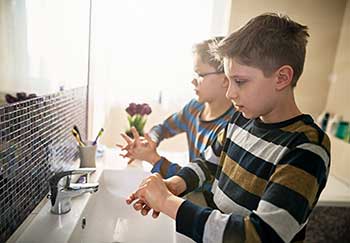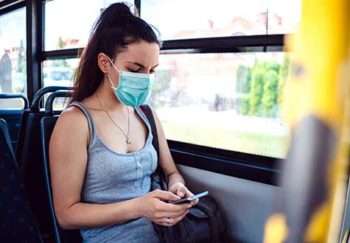
You don’t have to be ill to feel the effects of the coronavirus. The flu-like virus known as COVID-19 has gone viral in other ways, too. Scary news about chaotic financial markets, suspended sports events, closed schools, and new infections dominates radio, TV, the web, and our conversations. Panic, stress, fear: Your kids have been exposed to all of this. What do you say? How do you keep your kids calm about coronavirus?
Know That It’s Normal
First of all, know that these feelings are normal. Whole communities can experience stress, depression, guilt, anger and worry during and after an infectious disease outbreak. Your entire family may feel anxious, even if the coronavirus hasn’t affected anyone you know and you’re at low risk for getting sick.
How Kids React to Disease Outbreak
Children are especially vulnerable during times of upheaval. Having their daily routines change can have a huge impact on their emotions. How your child reacts will depend on a number of factors, including their age and emotional development. They’ll also take their cues from you.
They may show signs of distress. They may not. Either way, you can support your child with an open conversation. Talking to your child can help them understand the situation, and cope with whatever they’re feeling.
Signs of Stress in Your Child
It makes sense if the coronavirus outbreak is causing your child stress. You may see signs of stress in these behaviors:
- Clinginess
- Moodiness
- Nightmares
- Bedwetting
- Whining
- Tearfulness
- Easily annoyed
- Trouble with schoolwork
- Headaches
- Stomachaches
- Not feeling well
- Thumb-sucking
Older kids may:
- Fear hanging out with friends
- Have trouble paying attention
- Get aggressive
- Act younger than normal
- Get hyperactive
- Stop doing chores
Signs of Stress? Talk to Your Kids
Not sure what to do as your child exhibits signs of stress? If you notice these behaviors, it’s time to talk.
Don’t be afraid to talk to your kids about coronavirus. Ignoring the topic won’t ease their fears. In fact, kids worry more when kept out of the loop.
How to Talk About Stressful Events
Whether you’re talking about the coronavirus pandemic, school shootings in the news, war or other violent events, follow the same principles for having a productive conversation with your kids.
Plan
Review common questions and answers. Talk these over with your partner or other caregivers in your children’s lives. Being ready for the conversation will give you the ability to provide information with confidence.
Don’t rush the conversation. Plan for a quiet space and give it enough time, so there’s no pressure to hurry.
Stay Calm
Kids can absorb adult emotions. If you feel stressed and worried, even if you don’t talk about it, your kids can tell.
So, take care of yourself. You can lessen your stress by:
- Talking to your friends
- Eating healthy meals
- Getting enough sleep
- Exercising
- Taking deep breaths
- Relaxing with yoga, meditation, journaling, a bath
- Having fun
- Avoiding binging on alcohol and caffeine
Not only will you bolster your physical and emotional resources, but you’ll also model healthy ways to cope.
Share Your Feelings
While you don’t want to dump stress on your child, you can and should share your feelings. This shows kids that their feelings are normal. It also gives them hope. Your ability to have worries yet remain calm gives them an example to follow.
Listen & Pay Attention
You want your child, no matter what age, to feel connected, protected and loved. So give them your full attention. Listen to what they have to say. Watch their reactions, and stay sensitive to their level of anxiety.
Speak Honestly
Answer your child’s questions with facts. Trying to lie, minimize or cover up the situation can lead to mistrust. However, you don’t need to give kids more information than they’ve asked for or can handle. Follow age-appropriate guidelines.
Coronavirus Ideas & Resources for Kids
Tips for Talking to Different Age Groups
Making your child feel secure requires different tactics depending on their age. But every kid needs reassurance.
Ages 0-5
- Get down to your child’s eye level.
- Speak in a calm, gentle voice.
- Keep the message simple.
- Use concrete words they can understand.
- Emphasize that grown-ups are doing everything they can to keep them safe and protected.
Ages 6-18
- Start by asking what they know.
- Clarify or correct information they’re missing or misunderstand.
- Expect to discuss details.
- Ask your child what worries them most.
- Brainstorm together ideas for coping.
- Empower kids to research the virus using trusted sources.
- Ask if they have more questions or if they got the answers they needed.
- Reassure your child by reminding them of other challenges your family has faced before with the message that you’re all in this together.
- Spend more time with them than usual, if you can.
What to Tell Your Kids About Coronavirus
An outbreak or pandemic like coronavirus leaves everyone feeling uncertain and out of control. Give your kids practical information. This restores a sense of control and can help them stay calm about coronavirus. Empower them by teaching them to prevent germs and protect themselves and the people they love.
You can also note that medical and school officials are working hard to ensure that people throughout the country stay healthy.
How to Wash Your Hands
Practice with your kids or as a family to make sure everyone’s doing it correctly.
- Wet your hands with clean, running water (warm or cold).
- Apply soap.
- Lather your hands with soap. Rub hands together. Don’t forget the backs of your hands, between your fingers and under your nails.
- Scrub your hands for at least 20 seconds. Sing the “Happy Birthday” song from beginning to end twice as a simple timer.
- Rinse your hands well under clean, running water.
- Dry your hands using a clean towel or air dry them.
- If no soap is available, use an alcohol-based hand sanitizer with at least 60% alcohol.
Wash Your Hands
Tell your kids to wash their hands when:
- They come in from outside
- Before eating meals or snacks
- After blowing their nose, coughing, sneezing
- After using the bathroom
Avoid Germs
Teach your kids to:
- Cough or sneeze into a tissue or your elbow (and throw used tissue in the trash right away)
- Keep their hands out of your mouth, nose and eyes
Don’t Fear Face Masks
Kids may see adults wearing face masks. They could feel frightened. As of mid-April, the CDC suggested wearing cloth face masks in public settings where keeping your distance from others is difficult.
Getting Sick Doesn’t Mean You Have Coronavirus
If you do get sick, it doesn’t mean you have COVID-19. People can get sick from all kinds of germs.
Don’t Blame Others
Your kids may hear others using biased language about the coronavirus. Remind your children that viruses can make anyone sick. Coronavirus isn’t caused by or spread by people of a certain race or ethnicity.
What is UVA Doing About COVID-19?
Find out what steps we’re taking to protect the community and our patients from coronavirus.
Close Quarters & Handling a Quarantine
You may get sequestered at home with your kids for days on end. But even if you don’t, you’ll need to find ways to destress during this outbreak.
- Limit how much time you spend reading or watching news about the outbreak.
- Take breaks from talking about the disease.
- Take walks together, getting fresh air and exercise.
- Use the time to do some spring cleaning.
- Remind everyone about the positive things.
- Practice gratitude.
- Do things for other people, like writing letters, making cards, donating to local charities.
- Focus on what you can control.
- Encourage quiet time.
- Make cleaning and hygiene habits routine, fun, group activities.
- Stick to a routine – kids do well with structure and predictable timelines. Keep regular mealtimes and bedtimes.
No matter what, keep the lines of communication open. Provide updates. Let your kids know they can ask questions as they come up.


Surely, this is one of the best blogs written on Coronavirus and its mental impact on our lives !! Social media has become a source of misinformation and by reading this blog, all the doubts are clear especially how to deal this situation with children.